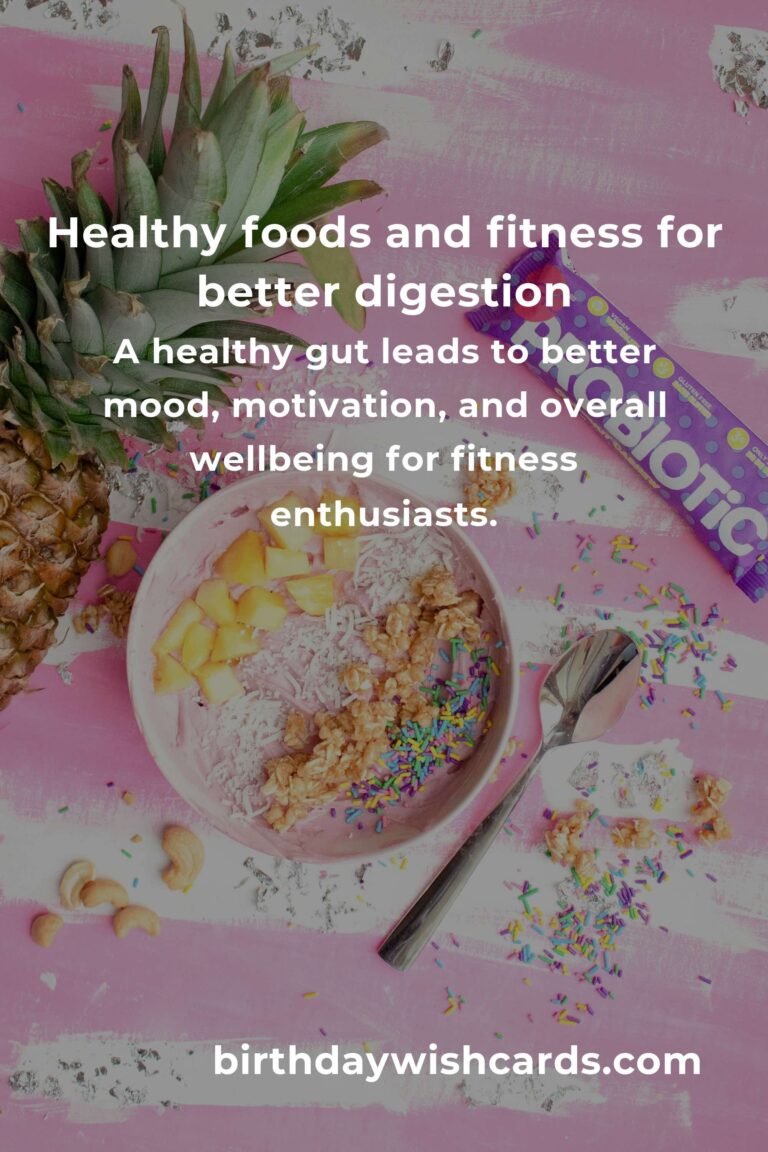
It’s easy to focus on sculpted muscles, intense cardio sessions, and the latest training routines. But there’s an often overlooked pillar that can make or break your athletic progress: digestive health. For fitness enthusiasts, a well-functioning digestive system isn’t just about comfort—it’s the foundation for energy, recovery, and overall wellbeing. Let’s dive deep into how you can improve your digestive health to unlock your full fitness potential.
Why Digestive Health Matters for Fitness
Digestion is more than just breaking down food. It’s how your body absorbs vital nutrients, eliminates waste, and keeps your gut microbiome balanced. For athletes and fitness lovers, optimal digestion means better nutrient absorption, enhanced muscle recovery, efficient fat metabolism, and a robust immune system. Poor digestion, on the other hand, can lead to bloating, fatigue, decreased performance, and even increased risk of injury due to poor nutrient delivery.
The Gut-Fitness Connection
Your gut is home to trillions of microbes that influence everything from your mood to your metabolism. Recent research has shown that a healthy gut microbiome can enhance exercise performance, reduce inflammation, and speed up recovery. Fitness enthusiasts often put extra stress on their bodies, making gut health even more crucial.
Key Ways Gut Health Influences Fitness:
- Energy Production: Gut bacteria help break down complex carbs into short-chain fatty acids, providing sustained energy for workouts.
- Immune Function: Around 70% of your immune system resides in your gut—keeping it healthy helps prevent illness and infections that can derail training.
- Inflammation Control: A healthy gut helps regulate inflammation, aiding recovery and reducing soreness.
- Mental Wellbeing: The gut-brain axis means digestive distress can impact focus, motivation, and even mood during training.
Signs Your Digestion Needs Attention
Fitness enthusiasts often overlook subtle digestive issues, attributing them to hard workouts or diet changes. But persistent symptoms can be a sign that your gut needs support. Watch out for:
- Bloating, gas, or abdominal discomfort
- Irregular bowel movements (constipation or diarrhea)
- Unexplained fatigue
- Skin breakouts
- Frequent colds or infections
- Food intolerances or sensitivities
- Poor workout recovery
Top Strategies to Improve Digestive Health for Fitness
1. Prioritize Whole, Nutrient-Dense Foods
Processed foods, artificial sweeteners, and low-fiber diets can disrupt gut health. Opt for:
- Whole grains like oats, brown rice, and quinoa
- Lean proteins (chicken, fish, tofu, eggs)
- Colorful fruits and vegetables
- Healthy fats (avocado, olive oil, nuts, seeds)
These foods fuel your workouts and provide the fiber and nutrients your gut needs.
2. Increase Dietary Fiber—Gradually
Fiber is crucial for healthy digestion, but sudden increases can cause discomfort. Slowly add more fiber-rich foods like beans, lentils, berries, and leafy greens to your diet. Water is your friend here—drink plenty to help fiber do its job and prevent constipation.
3. Stay Hydrated
Hydration is essential for everyone, but especially for athletes. Dehydration can slow down digestion, leading to constipation and sluggishness. Aim to sip water throughout the day, and consider electrolyte-rich drinks if you’re sweating heavily.
4. Support Your Gut Microbiome
Probiotics (beneficial bacteria) and prebiotics (food for those bacteria) play a huge role in gut health. Include:
- Fermented foods like yogurt, kefir, sauerkraut, kimchi, and kombucha
- Prebiotic-rich foods such as garlic, onions, asparagus, bananas, and whole grains
Supplements can help, but food sources are often more effective and provide additional nutrients.
5. Manage Stress
High-intensity training and daily life can elevate stress hormones, which negatively impact digestion. Incorporate stress-reducing activities like meditation, deep breathing, yoga, or even a mindful walk. Adequate sleep is also crucial for gut repair and overall health.
6. Time Your Meals Wisely
Eating too close to intense workouts can cause cramps, while training on an empty stomach might leave you feeling weak. Try to eat a balanced meal 2-3 hours before exercise, and a recovery snack within an hour after. Listen to your body and adjust meal timing based on comfort and performance.
7. Chew Thoroughly and Eat Mindfully
Rushing through meals is common, but it can impair digestion. Chewing starts the digestive process and signals your gut to get ready. Eat slowly and savor each bite—this simple habit can reduce bloating and improve nutrient absorption.
8. Address Food Sensitivities
If you notice certain foods consistently cause discomfort, consider keeping a food diary. Common culprits include dairy, gluten, and high-FODMAP foods. If symptoms persist, consult a healthcare professional or dietitian to investigate intolerances or allergies.
9. Don’t Ignore the Power of Rest Days
Rest days aren’t just for muscle recovery—they also give your digestive system a break. Overtraining can stress your gut, so make sure to schedule downtime for both your body and your belly.
10. Supplement Wisely
Some athletes benefit from digestive enzymes, probiotics, or specific vitamins and minerals (like magnesium or zinc). However, supplements should never replace a balanced diet. Consult a healthcare provider to find out what’s right for you.
Common Digestive Challenges for Fitness Enthusiasts
Let’s address some of the most frequent digestive issues faced by those who push their bodies to the limit:
Runner’s Gut
Intense cardio, especially running, can sometimes lead to cramping, diarrhea, or urgency. This is due to reduced blood flow to the intestines during exercise. To prevent runner’s gut, avoid high-fiber or fatty foods before training, stay hydrated, and allow ample time between eating and running.
Protein Overload
Many fitness enthusiasts ramp up their protein intake to build muscle. However, excessive protein—especially from supplements—can cause bloating or constipation. Choose high-quality protein sources and balance your macros with adequate fiber and healthy fats.
Electrolyte Imbalances
Heavy sweating can deplete sodium, potassium, and magnesium—minerals essential for smooth digestion. Include electrolyte-rich foods like bananas, potatoes, spinach, and coconut water to restore balance.
Supplement Side Effects
Some pre-workouts, artificial sweeteners, or supplements can upset your gut. If you notice digestive distress after using new products, try eliminating them one at a time to identify the culprit.
Sample Meal Plan for Gut-Friendly Fitness
Here’s a sample day that balances fuel for performance with digestive health:
- Breakfast: Overnight oats with chia seeds, blueberries, and a dollop of plain yogurt
- Snack: Apple slices with almond butter
- Lunch: Grilled chicken breast, quinoa, roasted sweet potatoes, and a leafy green salad with olive oil
- Pre-workout: Banana and a handful of walnuts
- Post-workout: Protein smoothie with kefir, frozen berries, and spinach
- Dinner: Baked salmon, steamed broccoli, and brown rice
Personalize your meals according to your preferences and dietary needs, but use this as inspiration for building a gut-supportive routine.
When to Seek Professional Help
If you’ve made lifestyle changes and still struggle with digestive issues, don’t ignore persistent symptoms. Chronic bloating, severe pain, unexplained weight loss, or blood in the stool warrant a visit to your doctor or a registered dietitian. They can help identify underlying conditions like IBS, food allergies, or other gut disorders.
The Emotional Impact: How Better Digestion Feels
Improved digestion isn’t just about better workouts. It’s about waking up with energy, feeling confident, and enjoying meals without discomfort. When your gut is happy, you’re likely to experience:
- Stable moods and reduced anxiety
- Consistent energy throughout the day
- More effective workouts and faster recovery
- Better sleep quality
- Increased motivation to stick to your fitness goals
Conclusion: Listen to Your Gut for Fitness Success
Digestive health is the silent partner in your fitness journey. Whether you’re a weekend warrior or a dedicated athlete, taking care of your gut will reward you with better performance, a stronger immune system, and a greater sense of wellbeing. Make small, sustainable changes, and remember: true fitness starts from the inside out. So, listen to your gut—it just might be your secret weapon.
Good digestive health is essential for maximizing fitness performance, energy, and recovery.
A balanced diet rich in whole foods, fiber, and hydration supports a healthy gut.
Listening to your body and adjusting your nutrition can prevent digestive discomfort during training.
Probiotics and prebiotics from natural food sources help create a thriving gut microbiome.
Chronic digestive issues shouldn’t be ignored; seeking professional help is important for long-term health.
Meal timing and mindful eating can make a significant difference in workout comfort and efficiency.
Managing stress and prioritizing rest days are crucial for both gut health and muscle recovery.
Identifying and addressing food sensitivities can prevent bloating and fatigue.
Supplements may help, but whole foods and tailored nutrition should always come first.
A healthy gut leads to better mood, motivation, and overall wellbeing for fitness enthusiasts.
#DigestiveHealth #GutHealth #FitnessJourney #WellnessTips #HealthyLiving #PerformanceNutrition #FitLife #AthleteWellbeing #MindBodyHealth

